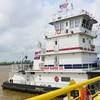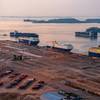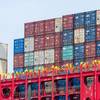Record Year for Indiana Ports
Indiana's three major shipping ports handled a record amount of cargo last year as a big jump in coal shipments helped them see 25 percent growth in 2018.
"The Ports of Indiana, which includes the Port of Indiana-Burns Harbor, the Port of Indiana-Jeffersonville and the Port of Indiana-Mount Vernon, handled 14.8 million tons of cargo last year, a 25% increase over 2017 and a 21% increase over its previous record year in 2015," said a press statement.
This was the first time the Ports of Indiana set records in each quarter, and the fifth consecutive year that the Ports of Indiana handled more than 10 million tons of cargo.
Key drivers in this record-shattering year included coal shipments (up 58% from 2017), soy products (up 26%) grain (up 17%) and steel (up 4%).
“We are so grateful for such an extraordinary year and fully appreciate what it took on behalf of all our port businesses and employees to achieve this kind of highwater mark,” said Vanta E. Coda II, CEO of the Ports of Indiana.
“Each of our ports builds and maintains exceptional infrastructure to allow our world-class port businesses to leverage what Indiana does exceedingly well – manufacture the products essential for modern life and move food products for the world. Our essential multimodal connections provide companies access to water, rail and road, and provide critical avenues for businesses to meet market demands and remain globally competitive,” Vanta added.
The Port of Indiana-Burns Harbor and the Port of Indiana-Jeffersonville collectively shipped more than two million tons of steel, which is each port’s largest commodity. The Port of Indiana-Mount Vernon, which has been breaking volume records for the past four years, handled 61% more coal this year than it did it 2017, and experienced increased shipments in ethanol, soy products and dried distillers grain.
This comes as the Ports of Indiana bolstered investments in its existing infrastructure at all three ports, pursued expansion through federal grants at its facilities in Burns Harbor and Jeffersonville and began the process to replace an overhead crane at the transit shed at Mount Vernon.














